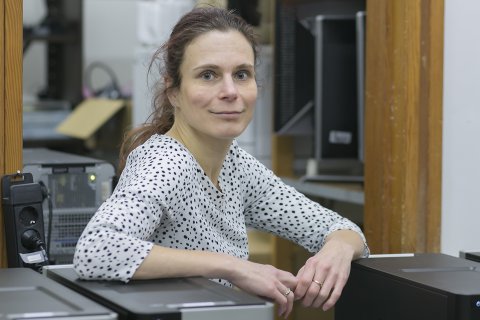Kirsten ten Tusscher appointed Professor of Computational Developmental Biology

The Executive Board of Utrecht University has appointed Dr. Kirsten ten Tusscher as Professor of ‘Computational Developmental Biology’ at the Department of Biology. Ten Tusscher is an internationally leading pioneer and expert in computational modelling of multi-cellular development, from plant roots to human embryos. Her approach provides new fundamental insights that can be applied in a variety of fields.
Kirsten ten Tusschers research focuses on unravelling the development of a single fertilized cell into a complex multicellular plant, animal or human of genetically identical cells, as well as the adaptation of these multi-cellular organism to their environment. Hereto, she develops sophisticated computer simulation models that integrate biological data from the subcellular to the whole organism scale.
From plant roots to human embryos
This computational modelling approach has proved very useful in advancing our understanding of complex developmental and adaptive processes. Ten Tusschers work for instance provided critical insights into the adaptation of plants roots to salt, important for future crop breeding, as well as into disabling developmental conditions in human embryos, such as scoliosis, that causes abnormal curvature of the spine.
Deciphering the core mechanisms of biological process
“The power of models is that they enable us to integrate knowledge from all kinds of processes occurring at widely different spatial and temporal scales and then allow us to play around with them”, Ten Tusscher explains. “Furthermore, models allow us to perfectly control particular processes, interactions and conditions, as well as enable us to decouple normally coupled processes. Thus models enable us to decipher the core mechanism underlying a particular biological process of interest.”
‘Do the impossible’
Furthermore, models offer the opportunity to ’do the impossible’, namely trying out alternative mechanisms not really found in nature. “Thereby, models allow us to not only investigate how a process works but also why nature is using a particular mechanism for a process”, Ten Tusscher adds.
Further strengthening of interdisciplinary research
Ten Tusscher collaborates with multiple groups within the Biology Department, takes part in the Sustainability-hub Future Food and is an associate member of the university’s Centre of Complex Systems Studies. This Chair will give her the opportunity to further strengthen her research within the university’s interdisciplinary Life Sciences, Sustainability and Complexity research programmes
Kirsten ten Tusscher
Kirsten ten Tusscher obtained her MSc in Biology from Utrecht University. She stayed on for a PhD project and successfully developed the first computational model for the electrical activity of a human heart cell. Continuing the project as postdoc, she realized the first computational human whole heart model for the simulation of cardiac arrhythmias. In 2008, she became an independent group leader at the Simula Research Laboratory in Oslo, Norway, and received the ‘Simula Researcher of the Year Award’. In 2010, she returned to the Utrecht University Biology Department as assistant professor, later associate professor. She won prestigious grants, including a Vidi and Aspasia, and a Building Blocks of Life Grant.

